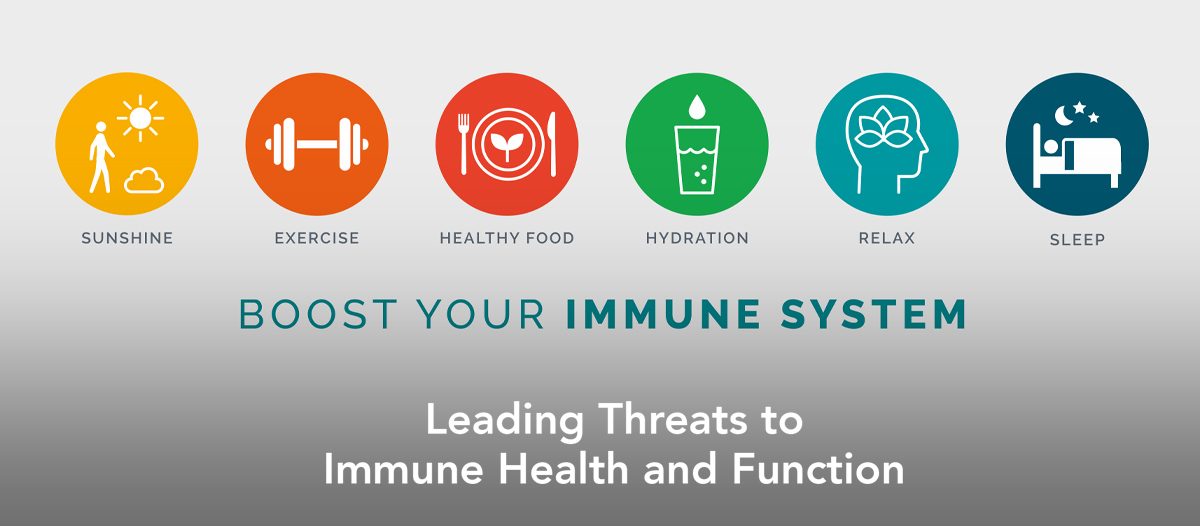Leading Threats to Immune Health and Function
by Mark J Kaylor
Maintaining a healthy immune system is crucial for overall well-being, but various factors can compromise its function. Here are some leading threats to immune health:
-
Poor Nutrition
A diet lacking in essential nutrients such as vitamins, minerals, and antioxidants can weaken the immune system. High consumption of processed foods, sugar, and unhealthy fats can also impair immune function.
-
Chronic Stress
Prolonged stress releases cortisol and other stress hormones that can suppress immune function. Chronic stress can also lead to unhealthy behaviors, such as poor eating habits and lack of exercise, further weakening the immune system.
-
Lack of Sleep
Insufficient sleep disrupts the production of cytokines, which are proteins essential for immune responses. Chronic sleep deprivation can reduce the effectiveness of the immune system and increase susceptibility to infections.
-
Sedentary Lifestyle
Regular physical activity is essential for a healthy immune system. A sedentary lifestyle can lead to obesity and other health issues that impair immune function.
-
Excessive Alcohol Consumption
High levels of alcohol intake can weaken the immune system and increase vulnerability to infections. Alcohol can also disrupt the balance of gut bacteria, which plays a crucial role in immune health.
-
Smoking
Smoking introduces harmful chemicals into the body that can damage the immune system. It increases the risk of respiratory infections and other immune-related diseases.
-
Chronic Diseases
Conditions such as diabetes, heart disease, and autoimmune disorders can compromise immune function. These diseases often involve chronic inflammation, which can weaken the immune system over time.
-
Poor Hygiene
Inadequate handwashing and poor sanitation can increase exposure to harmful pathogens, overloading the immune system and leading to frequent infections.
-
Environmental Toxins
Exposure to pollutants, chemicals, and toxins in the environment can impair immune function. These substances can cause chronic inflammation and damage immune cells.
-
Dehydration
Adequate hydration is necessary for the optimal function of all body systems, including the immune system. Dehydration can impair the ability of the immune system to transport nutrients and remove toxins.
-
Obesity
Excess body fat can lead to chronic inflammation and hormonal imbalances, which can weaken the immune system. Obesity is also linked to a higher risk of infections and immune-related diseases.
-
Aging
Yep, as we age, our immune system naturally weakens. This decline in immune function makes older adults more susceptible to infections, diseases, and slower recovery times.
-
Overuse of Antibiotics
Misuse and overuse of antibiotics can disrupt the balance of beneficial bacteria in the gut, which is vital for a healthy immune system. This imbalance can lead to reduced immune function and increased vulnerability to infections.
By recognizing and addressing these threats, we can take proactive steps to support and maintain a healthy immune system. Prioritizing a balanced diet, regular exercise, sufficient sleep, stress management, and avoiding harmful behaviors are key to preserving immune health and function. And of course, taking your mushrooms.
Building Your Immune Shield: Small Steps for Big Health Benefits
By incorporating these natural remedies into your daily routine, you can build a resilient immune system that is well-equipped to handle the challenges of cold and flu season. A balanced diet, healthy lifestyle habits, quality sleep, moderate exercise, and targeted supplementation with key vitamins, minerals, and immune-supporting herbs can make all the difference in staying healthy and energized. Take charge of your immunity today to enjoy a healthier tomorrow.
References
- Gombart, A. F., Pierre, A., & Maggini, S. (2020). A Review of Micronutrients and the Immune System–Working in Harmony to Reduce the Risk of Infection. Nutrients, 12(1), 236.
- Tan, C. W., et al. (2020). Vitamin D and SARS-CoV-2 infection: SARS-CoV-2 infection and immunity. Journal of Clinical Endocrinology & Metabolism, 105(10), dgaa637.
- Negrut, N., et al. (2021). Beta-glucan’s properties for application in various medical conditions and possible future directions. Journal of Immunology Research, 2021, 2468063.
- Patel, S., & Goyal, A. (2020). Propolis as a natural remedy: A review of its antibacterial properties and efficacy in treating respiratory infections. Journal of Natural Products, 83(6), 2022–2030.
- Chang, Y. S., et al. (2019). Review on the pharmacological actions of Ginseng for respiratory health. Journal of Ginseng Research, 43(2), 210–221.
Mark J. Kaylor is a passionate advocate for holistic health and natural remedies, with a focus on extending both lifespan and healthspan. As the founder of the Radiant Health Project and host of Journey to Radiant Health Podcast, Mark blends in-depth research with traditional wisdom to empower others on their journey to vibrant health. Through his writing and speaking, he shares insights into the transformative power of herbs, nutrition, and lifestyle practices.
Disclaimer: All information and results stated here is for educational and entertainment purposes only. The information mentioned here is not specific medical advice for any individual and is not intended to be used for self-diagnosis or treatment. This content should not substitute medical advice from a health professional. Always consult your health practitioner regarding any health or medical conditions.




